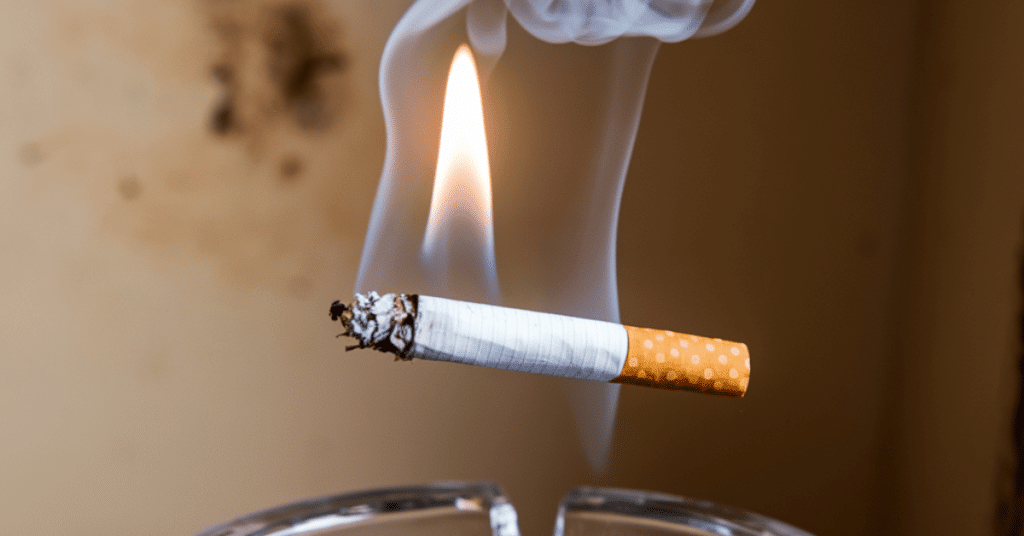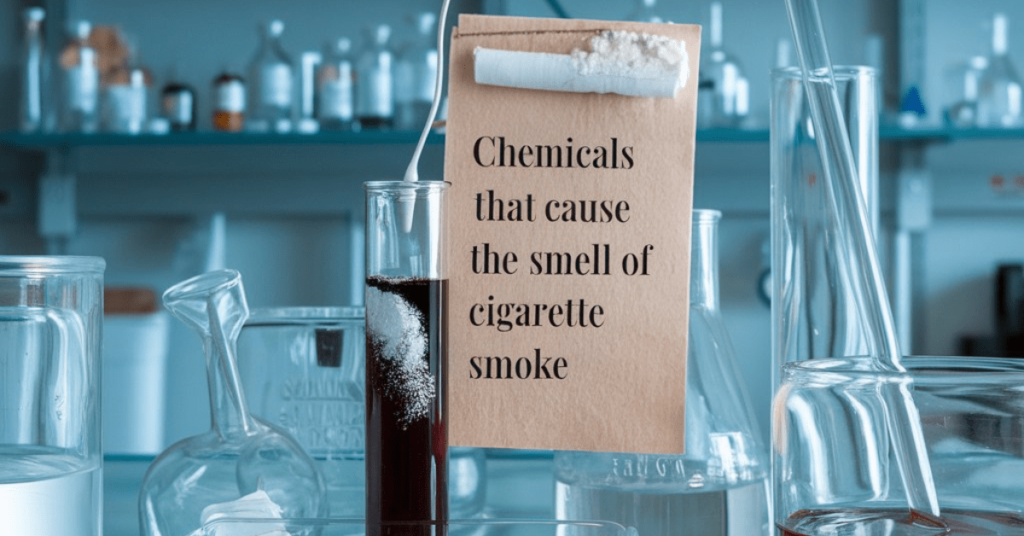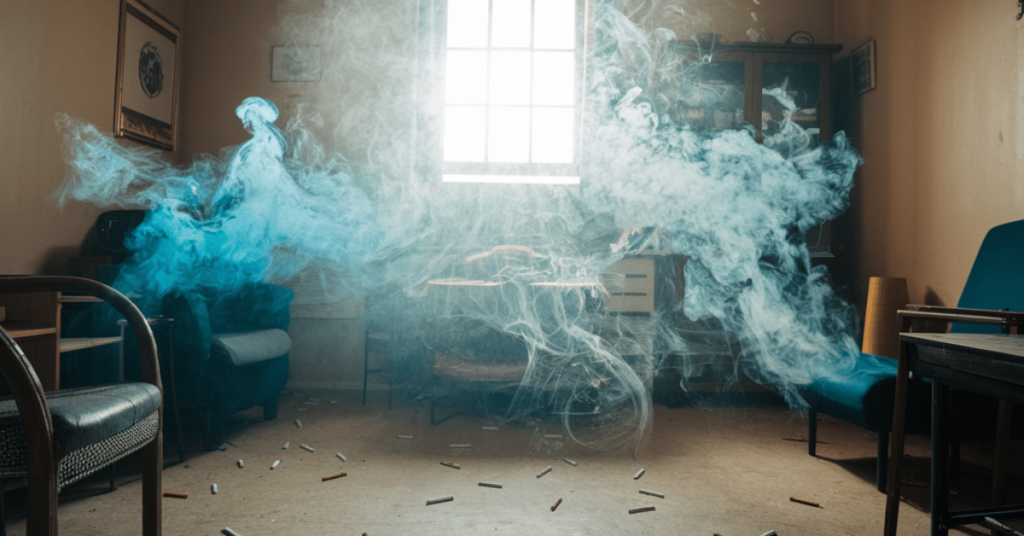The smell of cigarette smoke is a distinctive smell that lingers for a long time after the cigarette is extinguished. Whether you are a smoker non-smoker or sensitive to smell Understanding Where Cigarette Smoke Comes From This article delves into the origin of the smell. Chemical composition of scent And why is it such a challenge to get rid of? Let’s explore every aspect of this ubiquitous smell. From the combustion process to the way smoke sticks to surfaces.

What causes the smell of cigarette smoke?
The smell of cigarette smoke is caused by a complex combination of factors. Cigarettes burn tobacco, additives, and other substances when lit, creating smoke filled with a variety of chemicals. This smoke is released into the air, causing a pungent smell. The smell isn’t limited to smokers. But it can spread to the surrounding environment by adhering to fabric, furniture, and even walls…
The main cause of the smell is the burning of organic matter. Most of which are tobacco leaves and paper. This results in the release of volatile organic compounds (VOCs), gases, and fine particles. These by-products of combustion are what create cigarette smoke’s well-known smell. Inhaling or absorbing these chemicals creates a lingering odor that is difficult to ignore.
Chemicals that cause the smell of cigarette smoke
Cigarette smoke contains over 7,000 chemicals, and approximately 250 are harmful. It causes a unique smell. The main culprits include nicotine, tar, ammonia, acetone, formaldehyde, and benzene.
Nicotine: This addiction doesn’t just affect the health of smokers. But it also creates a sticky residue that sticks to the surface. Create a long-lasting scent…
Tar: particles
Ammonia and acetone: These chemicals are known for their strong odors and are found in many household cleaning products. Makes it easy to detect…
Formaldehyde: This chemical compound causes the pungent smell of cigarette smoke. And used in the production of construction materials and as a preservative…
Benzene is another chemical with a strong odor that is carcinogenic and found in various industrial processes.
The combination of these chemicals and their reaction during combustion creates a strong odor that is perceptible even at low concentrations.

How does cigarette smoke remain in the environment?
Exposure to cigarette smoke has a unique ability to combine virtually any substance. Penetrates fabrics, carpets, textiles, and even painted surfaces. When smoke particles settle, they form a thin layer that traps odors and can be released back into the air without disturbing them. And that is why the area can smell of cigarette smoke even after thorough cleaning.
One important factor behind this lingering smell is “thirdhand smoke,” which refers to the residue left on surfaces after visible smoke has dissipated. Thirdhand smoke can cling to clothing, upholstery, and even skin. It continues to release toxic chemicals. This may further reduce indoor air quality. And leads to continuous problems with odors.
Effects of cigarette smoke on indoor air quality
Cigarette smoke has a huge impact on indoor air quality. When someone smokes in the house, the concentration of hazardous chemicals will increase. This poses a risk to everyone in the vicinity. These chemicals don’t just disappear when you put out your cigarette. But it can also float in the air for a long time. Smoke particles are so fine that they can bypass many air filtration systems. The system easily makes it difficult to get rid of
Long-term exposure to small amounts of these chemicals can cause respiratory problems, allergies, and other health complications. That’s why non-smokers often find the smell of cigarette smoke bothersome. Annoying It’s not just the smell. But also the health risks involved.
Why is it so difficult to get rid of cigarette smoke?
Breathing in cigarette smoke can be very challenging. This is because it can penetrate porous surfaces and clothing. When the smoke clears It releases water-soluble debris that clings to the surface. Normal cleaning methods may not be enough to break down these stubborn particles.
In addition to the physical residue Cigarette smoke also changes the pH level of surfaces, making them more likely to absorb and retain odors. This chemical change means that standard air fresheners or cleaners will only temporarily mask the odor. Without fixing the real cause Special procedures or treatments, such as ozone machines or thermal fogging This is often necessary to neutralize the smell.
Health effects from inhaling cigarette smoke
Inhalation of cigarette smoke poses serious health risks, whether primary or secondary. Chemicals in cigarette smoke can cause respiratory problems, heart disease, and even cancer. Secondhand smoke in particular is dangerous because it exposes non-smokers to the same harmful substances without their consent.
Even residual thirdhand smoke can be harmful. This is especially true for young children, who are more likely to come into contact with contaminated surfaces. Understanding Where Cigarette Smoke Smells Come From Emphasizes the importance of maintaining a smoke-free environment to protect health and well-being.

Tips for getting rid of the smell of cigarette smoke
If you are dealing with the lingering smell of cigarette smoke, Here are some effective tips to help prevent such odors.
Ventilation: Open windows and doors to allow fresh air to circulate and disperse smoke particles.
Deep cleaning: Wash all clothes. Including curtains, cushions, and sheets. Use baking soda or vinegar to neutralize the smell.
Activated Charcoal: Place a bowl of activated charcoal around. Room to absorb odors
Air purifier: Use a HEPA air purifier designed to capture fine smoke particles and neutralize odors.
Professional cleaning: persists, If the smell persists consider hiring a professional service that specializes in smoke and odor removal.
How to prevent cigarette smoke from sticking to surfaces
Prevention is the best solution when it comes to cigarette smoke. You can’t get hung up on shit here.
Outdoor Smoke: Avoid smoking indoors to prevent smoke from accumulating on surfaces.
Using an air filter: Install an air filter or an air purifier with an activated carbon filter to capture smoke particles.
Designated smoking area: If smoking is required Create a designated area away from common living areas.
Routine Maintenance: Clean surfaces regularly with appropriate products to remove developing residue.
How does cigarette smoke affect various materials?
Cigarette smoke doesn’t just hang in the air. It interacts with every page it interacts with. Porous materials, such as fabric, carpet, and upholstery, are especially likely to absorb and retain smoke particles. These substances trap odors deep within the fibers. This makes it incredibly difficult to remove. Porous surfaces such as walls, table tops, and tiles are irresistible. As time passes, the chemicals in the smoke form a thin, sticky substance. What adheres to these surfaces causes the chemical properties to change and the smell to remain.
This lingering smell isn’t just a surface problem. But it can also penetrate deeper into the inner layers of walls and insulation. The viscosity of certain compounds in cigarette smoke sticks tenaciously to surfaces, creating a coating that can release odors back into the air. This is why heavily fumigated rooms often require not only cleaning but also cleaning. But you still need to repaint or change the material to get rid of the smell. The smell is gone.
The role of temperature and humidity in the persistence of smoke odor.
Temperature and humidity play an important role in how cigarette smoke behaves and how long it lasts in the environment. Higher temperatures make the volatile organic compounds (VOCs) in cigarette smoke more active. This makes the scent more pronounced. On the other hand, cooler temperatures lighten the scent but do not eliminate it. The compound still exists and can regenerate when the temperature rises again.
However, humidity makes the situation worse. Humidity in the air helps smoke particles stick to surfaces and clothing more effectively. Makes it stronger and longer lasting. Humid environments make getting rid of cigarette smoke more challenging. This is because the water in the air helps the compound penetrate deeper into the surface. And that is why homes in humid climates or poorly ventilated locations tend to have a more prevalent smell of cigarette smoke.

FAQs
Why does the smell of cigarette smoke last so long?
Cigarette smoke persists because it contains volatile organic compounds (VOCs) and fine particles that can penetrate porous surfaces and stick to walls, furniture, and clothing. These compounds are difficult to remove completely. By leaving a long-lasting smell
Can cigarette smoke affect my health even if I don’t smoke?
Yes, secondary smoke can be just as dangerous. as primary smoke This increases your risk of respiratory disease, heart disease, and even cancer. Residues from secondhand smoke can also pose health risks. Especially for small children and pets.
What are some effective ways to get rid of the smell of cigarette smoke?
Some effective methods include using air fresheners. Deep cleaning of all types of clothing Using activated charcoal to absorb odors And choosing a professional cleaning service that specializes in removing smoke and odors…
Is it possible to eliminate the smell of cigarette smoke?
Although this can be challenging it is possible to reduce or eliminate the smell of cigarette smoke with the right techniques and products. This may include a deep cleaning. Ventilation and the use of special treatments such as ozone generators or thermal fog.
Why do some people find the smell of cigarette smoke more repulsive than others?
Sensitivity to the smell of cigarette smoke varies from person to person. Non-smokers, children, and people with respiratory problems tend to be more sensitive to the smell. Due to health risks and discomfort.
Conclusion
The smell of cigarette smoke is more than just a nuisance. It is a complex mixture of chemicals that remains in the atmosphere for a long time after the cigarette is extinguished. Understanding the origin and composition of this odor can help you find effective ways to eliminate the odor and keep your environment fresh and clean. Whether you’re dealing with lingering odors or trying to prevent smoke from entering your residence, taking proactive measures to create a healthier and more pleasant environment is important.

